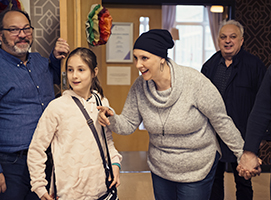Talking to a Loved One With Cancer
Cancer. The word is scary enough to think about — let alone talk about. But when you learn a friend, family member, co-worker, neighbor or anyone you know has cancer — it’s important to reach out to him or her.
The isolation that cancer patients face is real. Cancer can bring fear, anxiety and may remind us of our own mortality. But we should let those affected know we care for them and that they are in our thoughts.
Here are some thoughts on how to show your interest and concern for them:
- Allow someone with cancer to deal with the condition and how to tell others. If you learn someone has cancer, don’t tell others unless you have permission from that individual.
- Likewise, if you learn about the condition from someone else — find out if the news is public. If not, it’s probably best not to discuss it with that individual until he or she is ready to talk about it.
- Know there will be good days and bad. It’s a natural part of the cancer journey.
- Feel free to include the person in everyday events and activities. But let him/her know that, for any reason, that if he/she is not up to it that day — it’s OK.
- Be encouraging, but don’t force your friend or family member to stay positive. He or she may have real fears and concerns. By telling him/her to be positive, you may be keeping him/her from sharing how he/she feels.
- Don’t be afraid to joke. For many, it can be a relief to talk about his or her condition in a way that isn’t serious. But again, don’t talk lightheartedly about what he or she is experiencing unless you know or sense it’s OK to do so. And if you’re unsure, just ask if he/she is OK with it or not.
- It’s usually not helpful to bring up other people who have had cancer. Every person’s cancer and how it affects him or her is unique. Your previous experiences have no bearing on his or her current condition. Or how his/her treatment will progress.
- Respect the individual. Let him or her treat the cancer as he/she desires, even if you may disagree.
- Ask how you can be helpful. Among the things you can offer is to help run errands, prepare a meal or just to visit — but check with your loved one before doing something for them.
Learn more about the cancer wellness and support that is available through the Coborn Cancer Center
